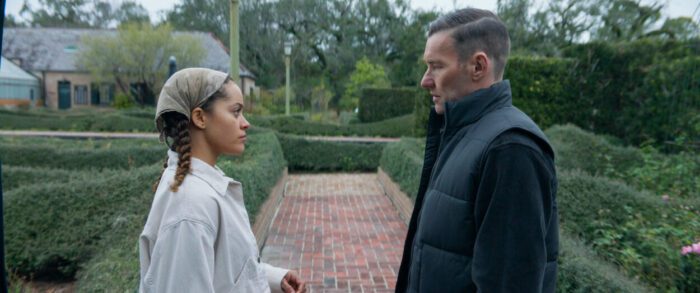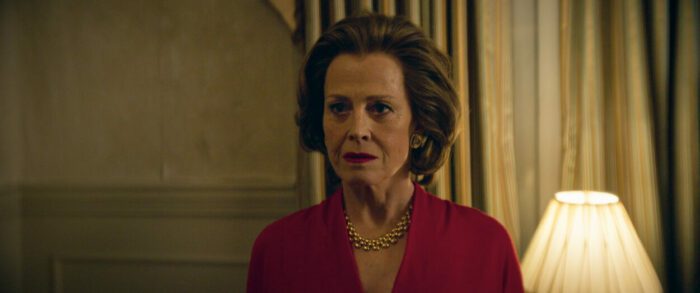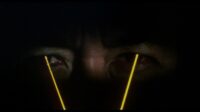With Master Gardener, Paul Schrader follows up his last two films First Reformed and The Card Counter with one more dealing in a remarkably similar subject. The last two films focused on leading men who deal with deep-seated contemporary issues through digging into their work and recording their thoughts in their journals, only to have their lives shaken with the arrival of an unexpected person. The image of the stern-faced man sitting in a dark room writing in his journal, in many ways a seminal symbol of Schrader’s body of work, has taken center stage in this trilogy. Master Gardener is no exception; this final entry has its fair share of journaling, and also a confrontation with the nature of the journal as a symbol and storytelling device. Indeed, Master Gardener is very much of a kind with Schrader’s last two films, and is in dialogue with them as well as the journal itself across Schrader’s entire filmography. It departs from them in notable ways, however, and in doing so, concludes this trilogy with a powerful drama that finds a surprising thread of hope and humor.

The film centers on Narvel Roth (Joel Edgerton), the head gardener at a lavish garden estate. Narvel is in hiding in witness protection from his past as a member of a white supremacist gang. He takes comfort and pride in the garden he’s created, and is close—very close—with the estate’s owner, Norma Haverhill (Sigourney Weaver). Narvel’s life is slowly challenged, however, when Norma asks him to take on her grandniece Maya (Quintessa Swindell), a troubled young biracial woman for whom Norma feels responsible. As Narvel teaches Maya to be a gardener, the two shake up each other’s lives in profound and surprising ways.
Schrader is a master of quiet drama, and Master Gardener, much like First Reformed and The Card Counter before it, feels like an increasingly idiosyncratic distillation of this style. His script is, as always, careful and powerful in its subtlety. The very presence and absence of characters themselves is in itself a source of emotion and information. Visually, Schrader moves the camera slowly and deliberately, inching through the delicate existence that Narvel has created. The film has a very notable visual contrast between the peace but sterility of Narvel’s “garden,” or really any place he finds himself in on purpose, and the world outside of that, that presents danger and chaos and ambiguity. This visual contrast is central to the film and is a particularly interesting piece of characterization.

Schrader takes care not to overstuff the film with characters; he maintains focus on the core of Edgerton’s Narvel, Swindell’s Maya, and Weaver’s Haverhill, allowing all three to shine. Weaver in particular is stellar, and oftentimes sets the tone herself for the scenes she’s in. Her character is the one of the core three not so burdened by the past, allowing her character a lightness and silliness that carries much of the film’s humor. She injects a vast amount of charisma and charm into a role that could easily have come off as one-note.
Master Gardener is not just a third entry into Schrader’s “man-with-journal” trilogy; it is conclusive, and it reflects an evolution of Schrader’s own views on his characters. Without spoiling the film, the note on which it ends is remarkably more optimistic than its two immediate predecessors. Characters, it seems, are able to flourish in the lives they create within the limitations of their world. The journal itself, as a storytelling device, is also the subject of some blunt meta-commentary at one point. It is clear that Schrader is done dealing in this specific space; he is interested, one might say, in turning a new page.
As with First Reformed and The Card Counter, There is of course an important discussion to be had about Master Gardener’s politics. All three films in Schrader’s trilogy touch contemporary hot topics in a tangential way to connect them to some personal thesis. With First Reformed, we’re all seemingly doomed, and all we have left is each other. With The Card Counter, the weight of our actions—as individuals, as a society—loom constantly over us until we answer for it. Master Gardener is just as contemporary if not more so than the previous two, white supremacy and fascism being elements of society that feel resurgent in America today. The film seems to suggest that moving beyond hate can be done alone, but learning to love is something that requires help. There is surely more to be said and unpacked from the film; time will be helpful in this regard. What I can say now is this: I, as a viewer, saw Narvel for what he was and had become, and sympathized. I wanted him to be happy.
In the end, What was most powerful about Master Gardener was just how Schrader portrays Narvel’s past and its weight over him. It’s not some kind of facile threat of revenge from his old Nazi friends. Rather, Narvel’s past hangs over him as the burden he is forced to bear alone. With the entrance of Maya into his life, Narvel sees the opportunity to finally suffer together with someone else, if only he can bear to show who he really is.
It’s in this way that Schrader makes Master Gardener more tender than the previous two films in his trilogy while maintaining his trademarks like his leads’ quiet, repressed sexuality. Narvel is already on the hard path to redemption, but he is alone. His world is safe but filled with people who either don’t know him or don’t really care about him. Swindell’s Maya throws a figurative wrench in this world, and presents to Narvel an existential question of how he can possibly be open and vulnerable with someone. Master Gardener is at its best when it deals with, beyond simply finding redemption, finding someone who can know and accept you for all you are and have been. This is a common thread across Schrader, and Master Gardener by no means revolutionizes his sense of idiosyncrasy. It is, though, still as beautifully done as ever, and is just different enough to feel notably refreshing.
Master Gardener appears in theaters May 19, 2023. Directed by Paul Schrader and starring Joel Edgerton, Sigourney Weaver and Quintessa Swindell.



